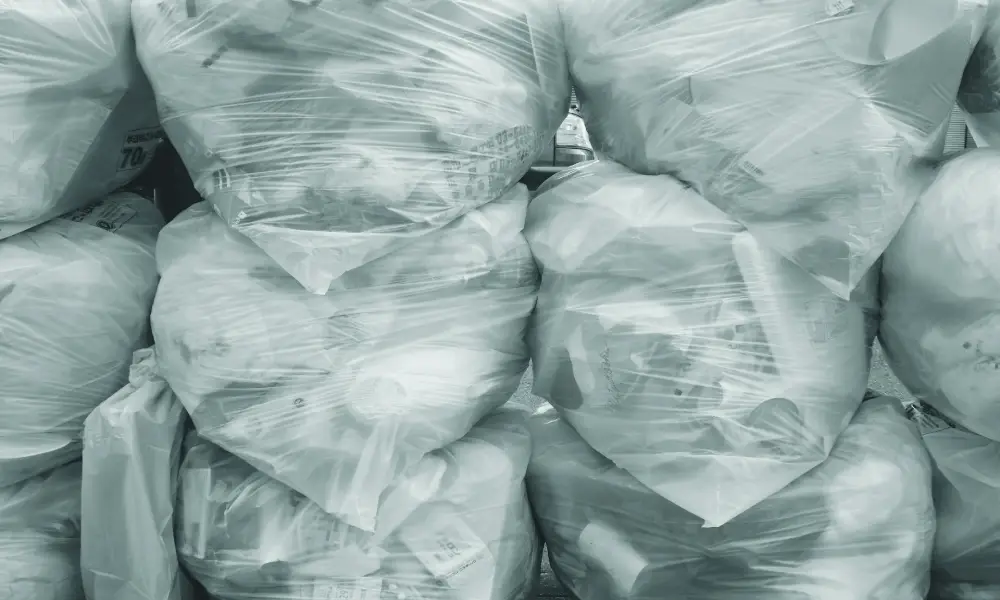Did you know the U.S. makes enough trash to circle the Earth 24 times? This shows the urgent need for responsible waste management. Even small choices like the type of trash bag can make a difference. Are trash bags recyclable? Understanding this can help reduce waste. Let’s discover eco-friendly waste management and how individual actions can contribute to a greener future.
Are Trash Bags Recyclable

The answer to whether a trash bag can be recycled lies in its material. Most bags are made from LDPE (Low-Density Polyethylene) or HDPE (High-Density Polyethylene), which are usually recyclable.
Some trash bags are recyclable but most trash bags aren’t recyclable in curbside bins due to jamming recycling equipment. The problem is contamination. When food scraps or other non-recyclables get into these bags, it can ruin the recycling process. Sorting through the mess becomes a challenge.
Look to your local recycling program to see if they have exemptions or drop-off sites that accept plastic film to recycle and learn proper disposal methods.
Some other trash bags are recyclable. You may see labeling with the recycling symbols, or items in the bag will feature descriptions indicating contents that are molded from recycled materials. Such bags promote recycling and also provide information to consumers about what they may place in the bag.

Materials Commonly Used in Trash Bags
- Low-Density Polyethylene (LDPE)
- High-Density Polyethylene (HDPE)
- Polyethylene Terephthalate (PET)
- Polypropylene (PP)
- Polystyrene (PS)
What trash bags are recyclable?
The truth is, there aren’t really any trash bags that are typically accepted in curbside recycling programs. This is because most trash bags, even if they claim to be made with recycled content, can mess up the sorting machinery at recycling facilities.
However, there are some alternatives:
- Compostable bags: While not recyclable, these bags break down in compost piles making them a good option for food scraps and yard waste.
- Reusable trash can liners: These are typically made from fabric and can be washed and reused multiple times.
Remember, the best approach is to check with your local recycling program for their specific guidelines on what they accept.
Sustainable Trash Bag Alternatives
Let’s look into eco-friendly alternatives to traditional plastic trash bags.
1. Compostable Bags
Biodegradable: Made from plant-based materials, these bags break down in commercial composting facilities.
Perfect for: Food scraps, yard waste, and other organic materials.
Note: Ensure they’re certified compostable to guarantee proper breakdown.
2. Reusable Cloth Bags
Durable and Versatile: These bags can be washed and reused multiple times, reducing single-use plastic.
Ideal for: Dry waste, like paper and cardboard.
Tip: Line your trash can with a reusable cloth bag to collect waste.
3. Paper Bags
Natural and Recyclable: A classic choice for lining trash cans.
Best for: Dry waste, especially if your local recycling program accepts paper bags.
Consider: Their potential to tear, especially when wet.
4. Reduce, Reuse, Recycle
Minimize Waste: The most sustainable approach is to reduce waste at its source.
Reuse Containers: Repurpose glass jars, plastic containers, and other items as storage containers.
Recycle Properly: Ensure you’re recycling correctly to maximize the impact.
By choosing sustainable alternatives, you can significantly reduce your environmental footprint and contribute to sustainability and a healthier planet.
Remember: Always check with your local recycling facility to confirm what types of bags and materials they accept.
FAQ's
Can you use trash bags for recycling?
No, you shouldn’t use trash bags for recycling. They can contaminate the recycling process and reduce its efficiency.
What bag to use for recycling?
Use paper bags or cardboard boxes for recycling. These are readily recyclable and won’t contaminate other recyclables.
Why aren't garbage bags recyclable?
Most garbage bags are made from low-density polyethylene (LDPE), a type of plastic that’s difficult to recycle.
Are white kitchen trash bags recyclable?
White kitchen trash bags are generally not recyclable.




